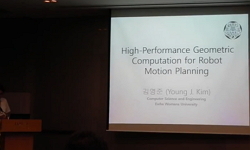Background: Night shift work is associated with many problems such as sleep deprivation, sleepiness, decreased cognitive performance, increased human errors, and fatigue. This study set out to measure cognitive performance, melatonin rhythms, and slee...
http://chineseinput.net/에서 pinyin(병음)방식으로 중국어를 변환할 수 있습니다.
변환된 중국어를 복사하여 사용하시면 됩니다.
- 中文 을 입력하시려면 zhongwen을 입력하시고 space를누르시면됩니다.
- 北京 을 입력하시려면 beijing을 입력하시고 space를 누르시면 됩니다.




Field Study of Effects of Night Shifts on Cognitive Performance, Salivary Melatonin, and Sleep
한글로보기https://www.riss.kr/link?id=A105407334
- 저자
- 발행기관
- 학술지명
- 권호사항
-
발행연도
2018
-
작성언어
English
- 주제어
-
등재정보
SCOPUS,KCI등재,SSCI,SCIE
-
자료형태
학술저널
-
수록면
203-209(7쪽)
- 제공처
- 소장기관
-
0
상세조회 -
0
다운로드
부가정보
다국어 초록 (Multilingual Abstract)
Background: Night shift work is associated with many problems such as sleep deprivation, sleepiness, decreased cognitive performance, increased human errors, and fatigue. This study set out to measure cognitive performance, melatonin rhythms, and sleep after different consecutive night shifts (7 vs. 4) among control room operators (CORs). Methods: The participants included 60 CORs with a mean age of 30.2 years (standard deviation, 2.0) from a petrochemical complex located in Southern Iran. Cognitive performance was assessed using the n-back task and continuous performance test. To evaluate melatonin, saliva was collected and tested by enzyme-linked immunosorbent assay. To assess sleep and sleepiness, the Pittsburgh Sleep Quality Index and Karolinska Sleepiness Scale were used, respectively. Results: Individuals who worked 7 consecutive night shifts had a significantly better cognitive performance and sleep quality than those who worked 4 consecutive night shifts. However, salivary melatonin profile and sleepiness trend were not affected by shift type. Conclusion: The main duty of CORs working night shifts at the studied industry included managing safety-critical processes through complex displays; a responsibility that demands good cognitive performance and alertness. It is suggested that an appropriate number of consecutive night shifts in a rotating shift system should be planned with the ultimate aim of improving CROs performance/alertness and enhancing safety.
동일학술지(권/호) 다른 논문
-
- Occupational Safety and Health Research Institute
- Phatrabuddha, Nantaporn
- 2018
- SCOPUS,KCI등재,SSCI,SCIE
-
- Occupational Safety and Health Research Institute
- Cecchini, Massimo
- 2018
- SCOPUS,KCI등재,SSCI,SCIE
-
- Occupational Safety and Health Research Institute
- Liautaud, Alexandre
- 2018
- SCOPUS,KCI등재,SSCI,SCIE
-
A Study of Cognitive Slips According to Contaminants on the Floor
- Occupational Safety and Health Research Institute
- Kim, Jong-Il
- 2018
- SCOPUS,KCI등재,SSCI,SCIE





 ScienceON
ScienceON





